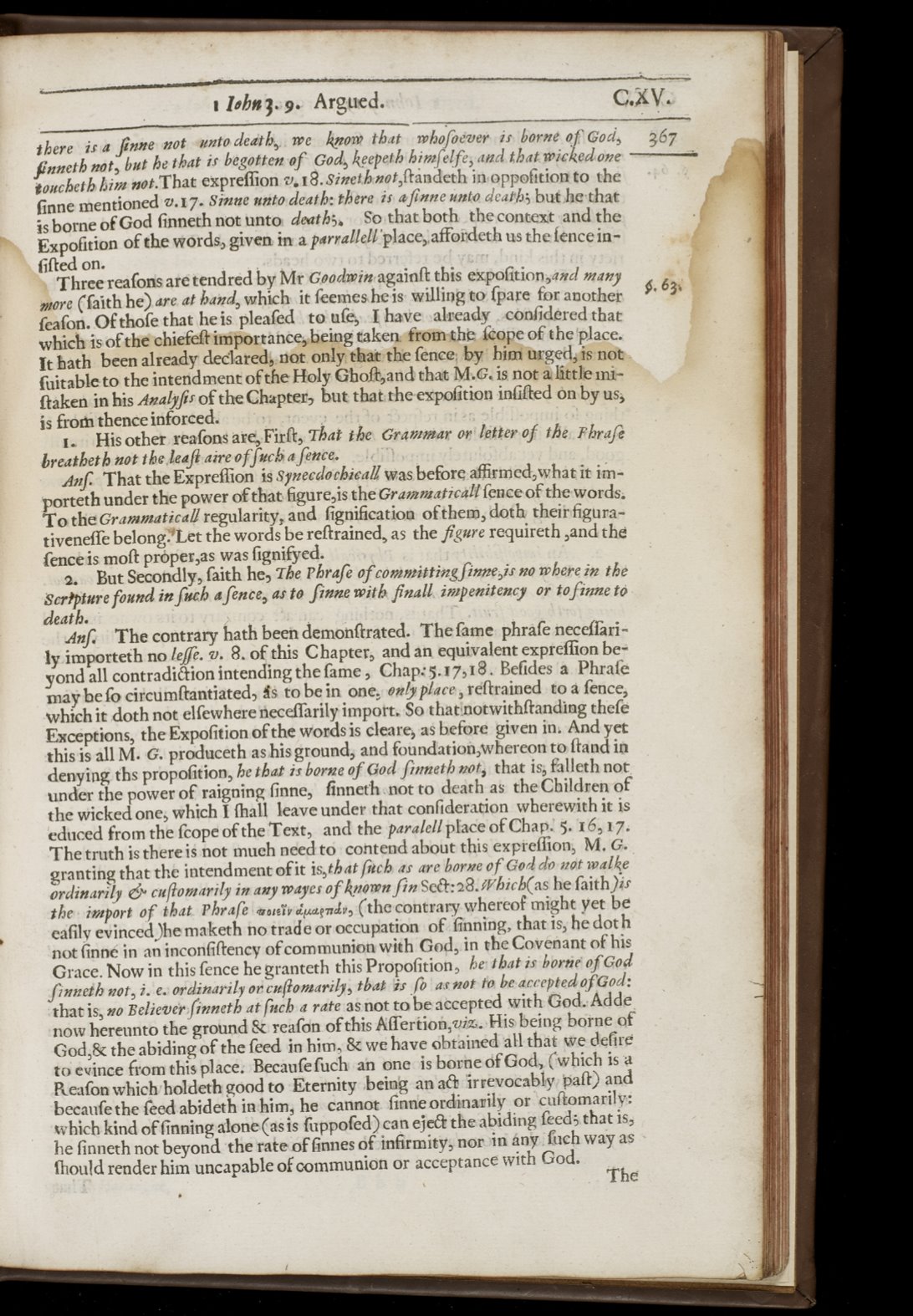

lohn;.
9.
Argued.
C.-4 V.
there is a
finne
not
unto
death,
we
know
that
whofoever
is
borne
of
God,
367
finneth not,
but
he
that
is begotten
of
God, keepeth
himrelfe,
and
that
wicked
one
ítoucheth
him
not.That
expreflion
v.18.
Sineth
not,flándeth
in
oppofition
to
the
finne
mentioned v.
r
7. Sinne unto death:
th.
e
i
afi
unto
context
death;
but
that
is
borne
of
God finneth not
unto
death
;,
s
the
Expofition
of the
words, given in
a
parrallell'place,,affordeth
us
the
fence
in-
fifted on.
Three
reafons
are tendred by Mr
Goodwin
againíl this expofition,and
many
6
more
(faith he)
are
at hand, which it feemes he
is-
willing
to
(pare for
another
§.
3
feafon.
Of
thofe
that
he
is
pleafed
to
ufe, I
have already confidered
that
which
is
of
the
chiefefl
importance, beingtaken from
-the fcope
of
the
place.
It
bath been already declared,
not
only
that
the
fence:
by him urged,
is
not
fuitable
to
the intendment
of
the Holy
Ghoß,and that
M.G.
is
not a little mi-
[taken
in his Analyf
s
of
the Chapter,
but
that
the
expofition
infiffed
on by us,
is
from thence inforced.
r.,
His
other
reafons are, Firfl, That the Grammar
or
letter
of
the Phrafe
breatheth
not the
leafs
aire
o
ffucb,
a
fence.
Alf
That
the
Expreffion
is
synecclochicall
was
before
affirm
ed,what
it
im-
porteth
under the power
of
that
figure,is
the
Grammatical!fence
of
the words.
To
the
Grammaticali
regularity and
fignification
of
them,
loth
their
figu
ra-
tiveneffe
belong
:let
the
words be
reflrained,
as
the
figure
requireth ,and the
fence
is
moll próper,as
was fignifyed.
2.
But Secondly,
faith
he,
The
Phrafe
of
committing
finne,is
no
where
in the
Scripture
found
infuch
a
fence,
as to
finne
with
finali
impenitency or
tofinne
to
death.
Anf.
The
contrary bath
been denionfirated.
The
fame phrafe neceffari-
ly
importeth
no
¡effe.
v.
8.
of
this
Chapter,
and an equivalent
expreffion
be-
yond
all
contradi
&ion
intending
the
fame
,
Chap:
5.
r7,
i
8.
Befides a
Phrafe
may
be
fo
circumflantiated,
As
to
be
in one,
only
place, reflrained
to
a
fence,
which
it doth
not
elfewhere neceffarily
import.
So
thatnotwithflanding
thefe
Exceptions,
the
Expofition
of
the
words
is
cleare,
as
before given
in. And
yet
this
is
all M.
G.
produceth
as
his
ground,
and
foundation,whereon
to
(land in
denying
the
propofition,
he
that
is
borne
of
God
finneth
not,
that
is,
falleth
not
under the
power
of
raigning
finne,
finneth
not
to
death
as
the Children
of
the
wicked one, which
I (hall
leave
under that
confideration wherewith
it
is
educed from the
fcope
of
the
Text,
and the paralell place
of
Chap.
5.
x6,
r
7.
The truth
is
there
is
not
much need
to
contend about
this expreffion, M.
G.
granting
that the
intendment
of
it
is,that
filch as are
borne
of
God do
not walke
ordinarily
&
cuflomarily
in
any wayes
of
known
fin
Se
&:28.Whicb(as he
faith)is
the
import
of
that
Phrafe n,,av
dµaendv,
(the
contrary whereof might yet be
eafily
evinced)he maketh no
trade
or occupation
of
finning,
that
is,
he
dot
h
not
(inne
in
an
inconfiiflency
of
communion with
God,
in
the Covenant
of
his
Grace. Now
in
this
fence he
granteth
this
Propofition,
he
that
is borne
of
God
finneth
not, i.
e.
ordinarily orcujlomarily, that
is
fo
as
not
to be accepted
ofGod:
that
is,
no
Believer
finneth at
fuck
a
rate
as
not
to
be accepted with
God:
Adde,
now
hereunto the ground
& reafon
of
this
Af}ertion,viz.
His
being
borne
of
God,&the abiding
of
the
feed
in
him, &
we
have obtained
all
that
we defire
to
evince from this place. Becaufefuch an
one
is
borne
of
God, (which
is
a
reafon
which
holdeth
good
to
Eternity
being an
a&
irrevocably pail) and
becaufethe
feed
abideth
in
him, he
cannot
finne
ordinarily or
cuflomarily:
which kind
of
finning alone (as
is
fitppofed) can
eje&
the
abiding
feeds
that
is,
he
finneth not
beyond the
rate of
fines
of
infirmity,
nor
in
any
filch
way
as
thould render
him uncapable
of
communion or acceptance
with
God.










